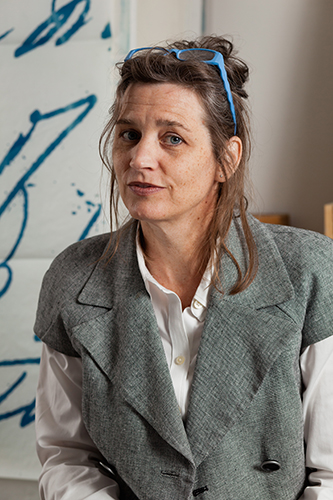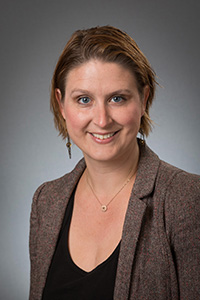Research Spotlight on Women Faculty: Carol Flueckiger, Courtney Gibson, and Amy Flowerree
March 10, 2020 |
During March, Texas Tech is celebrating women faculty who exemplify excellence in research, scholarship, creative activity, teaching, and mentoring.
Carol Flueckiger
Associate Professor; Coordinator of Art Foundations; School of Art

Flueckiger has developed a mixed media painting technique that uses the blistering West Texas sun to expose blueprints of historic handwriting and vintage graphics onto painted wood surfaces, paper and fabric.
What inspired you to work in your field/area of expertise?
My artwork is at the intersection of painting, first wave feminism, and solar energy. The year 2020 marks the 100th year anniversary of the 19th amendment and the 50th year anniversary of Earth Day, two historic events that have shaped my research. Working with sunlight to expose imagery in my compositions, I think of west Texas as the world's largest light table. It is an additive color landscape – more light than land, more horizon than pavement, more sky than earth. My paintbrush is the sun; an energy resource that I use to illuminate history. Early American feminist handwriting along with bicycles and tumbleweeds reflect the geography I live in both physically and spiritually.
Who inspired you to pursue academia?
Research on Elizabeth Cady Stanton, a first wave feminist, for a women's history month artist exhibition two decades ago, inspired me to broaden my layered, weathered landscape paintings to include historical information. I was able to digitize and imprint Stanton's handwriting directly into the composition to shape both the aesthetics and meaning of the artworks.
What would you tell your female students interested in pursuing an academic career?
An academic career in art will challenge your ideas about the beauty and power inherent in the process of making & designing. It is a unique blend - part craft, part research, part professional development, and part community involvement. There is a place for your voice in this world.

Courtney Gibson
Assistant Professor; Department of Agricultural Education & Communications
 Gibson has been recognized for her teaching abilities through several awards including
the 2014 Helen DeVitt Jones Excellence in Graduate Teaching Award at Texas Tech University
and the 2011 Outstanding Teacher Award from Harmony Public Schools.
Gibson has been recognized for her teaching abilities through several awards including
the 2014 Helen DeVitt Jones Excellence in Graduate Teaching Award at Texas Tech University
and the 2011 Outstanding Teacher Award from Harmony Public Schools.
What inspired you to work in your field/area of expertise?
I grew up in West Texas surrounded by agriculture. Growing up, I was actively involved in 4-H and FFA and grew to appreciate the industry and its contributions to our world. Studying agricultural communications as an undergraduate only deepened this appreciation and opened my eyes to new possibilities and ways of addressing the challenges faced by the industry. During my time as a junior high teacher, I saw firsthand the effects that misinformation and separation from the agricultural industry had on young adults' views and beliefs of where their food and clothing came from. These experiences helped me realize the importance of communicating effectively for and about the agricultural industry to a variety of audiences. As a student I always loved my design classes and getting to create visual material focused on agriculture. My creative side and my love for designing have allowed me to focus my research and teaching in the realm of creativity, visual communications, and graphic design that help communicators more effectively meet the needs of the agricultural industry. I continue to be inspired everyday by the creativity of our students and the unique perspectives they bring to our program.
Who inspired you to pursue academia?
I have been blessed to have had some wonderful faculty members throughout my academic career. Each one of them has played a major role in inspiring me to pursue a career in academia. Seeing the passion they had (and still have) for their students, their research, and their field of study made me realize that perhaps that is where my own passions lie as well. Graduate school was never something I had seriously considered for myself until I was finishing up my undergraduate degree and my advisor, Dr. Cindy Akers, suggested I consider getting a master's degree. Having someone that I looked up to see that potential in me was all it took to change the course of my life. Working more closely with faculty members in my master's and doctoral programs allowed me to further realize the passion I have for not only the field of agricultural communications, but for teaching as well. Cindy Akers, Erica Irlbeck, David Doerfert, and Steve Fraze all greatly encouraged me to purse my Ph.D. and served as wonderful mentors during that program. Without these individuals cheering me on along the way, I wouldn't be where I am today.
What would you tell your female students interested in pursuing an academic career?
An academic career is one of the most challenging, yet most rewarding careers. Not only do you get to pursue your passions, you get to gather new knowledge on those topics and advance our understanding of them. You also get to teach and inspire students who may go on to further advance your field of study as well. The work I do with both graduate and undergraduate students is what really drives me and helps me see the impact I can have on this world. While it isn't always easy (but what worth doing really is), having a student or stakeholder tell you how much of an impact you made on them is one of the most rewarding moments you'll ever have. When things seems tough or super busy or even impossible, remember why you started this journey, why this career matters to you, the countless individuals that have inspired you along the way, and the many students you will hopefully inspire in the future. You're doing this not only for you. You're doing this for them as well.

Amy Flowerree
Assistant Professor; Department of Philosophy
 Flowerree focuses on the intersection of epistemology, ethics and metaethics.
Flowerree focuses on the intersection of epistemology, ethics and metaethics.
What inspired you to work in your field/area of expertise?
I fell into philosophy by accident. In high school and college, I was driven to understand the world. I kept asking questions, much like a three year old pestering her parents, "But why is it like this? But how do you know that?" I think I really annoyed my professors. When I finally discovered philosophy, it was like finding my intellectual home. Philosophy as a set of intellectual tools that we use to formulate and answer questions of great significance: What is a good life? What do I owe other people? What can I know? There are a set of "traditional" questions in philosophy, which are fascinating of course, but what I love about it most is that it gives me the tools to ask the questions that puzzle me.
I went to graduate school because I wanted to understand what to believe. How could I know if my beliefs were right? How could I be a better believer? Should we hold each other responsible for our beliefs? I was worried about particular kinds of beliefs: religious beliefs, moral beliefs, beliefs about other's moral character, beliefs about myself. Thankfully, there were graduate programs willing to support my philosophy habit.
Who inspired you to pursue academia?
Like I said, I ended up here by accident. But there are several amazing women who continually inspire me. The first is Margaret Atherton. She is the first female philosopher I ever met. She taught a seminar on George Berkeley my first year of graduate school. I partially model my classroom demeanor after her. She is a complete badass. She taught me how to read philosophy charitably, always looking for the very best version of the argument, never laughing at someone for their view. Frequently, we laugh at ideas because we don't take the time to understand them. Margaret taught me the value of engaging others seriously. The other three are Jennifer Lackey, Kyla Ebels-Duggan, and Helga Varden. I learned so much from them, as scholars, teachers, authors, and human beings. All three show that it is possible to be a top scholar, while also showing care and compassion for fellow persons.
What would you tell your female students interested in pursuing an academic career?
While there are special challenges that women can face (particularly in a male-dominated field like philosophy), I would tell female students the same thing I tell all my students. If you're good enough to be an academic philosopher, you're good enough to do any number of impressive things. You should only choose philosophy if it is your first love, if you rank the path to truth above material comfort and career recognition. Becoming an academic philosopher is a long, lonely journey. Surround yourself with people who support you, always be kind to others, especially those who are vulnerable, and pursue your passion projects, rather than what's trendy.
For women, it's true that your life will go better if you are unflinchingly tough, if you don't compare yourself to others, if you outwork the men in your department, while putting on a smile and hosting tea time. But I don't advise women to do this. It is an injustice that this is considered normal, and I refuse to reify that norm by passing it on to students. Instead, recognize that expectations may not be fair, and tend to yourself and your needs.
Office of Research & Innovation
-
Address
Texas Tech University, 2500 Broadway, Box 41075 Lubbock, TX 79409 -
Phone
806.742.3905 -
Email
vpr.communications@ttu.edu
